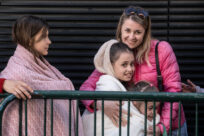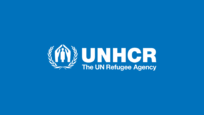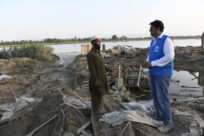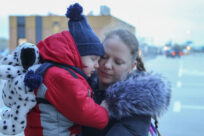From Syria to Sweden: Eiad´s perilous voyage across the Mediterranean
Eiad’s wife did not want him to embark on the perilous journey across the Mediterranean Sea to safety in Europe, but Eiad believed it was their only option. They had tried to build a new life in Egypt, but after two years in the country, Eiad realized he would not be able to provide a good future for his young children there. “Life wasn’t very good in Egypt”, he explains. In spite of his wife’s protests, Eiad decided to risk his life in a rickety boat sailing from Egypt to Italy. His wife and children returned to Damascus. “I was more worried about the kids”, he says. “I thought that if my life will finish, it will finish anyway – in Egypt, in the sea, wherever.”
After one and a half months of searching, he made contact with a human smuggler. The price for getting to Europe: 2,500 dollars. “We went in a group so it would be cheaper. The safest way to travel to Europe is through Turkey but it’s much more expensive. Sometimes, it can cost more than 8000 dollars per person” says Eiad. He describes the five-day boat journey to Italy with more than 300 others as “hell”- people were thrown into the boat and the smugglers did not care if they fell into the water. “If they had animals with them, they would take better care of them because they’re worth more to them”, says Eiad. Still, there was a sense of solidarity between passengers. Eiad recalls how two people almost fell off the boat in their sleep but were caught by the other passengers.
After reaching the shores of Italy, Eiad headed towards Northern Europe and arrived in Sweden on 12 October 2014. Coming here was a great relief, but life as a refugee has its daily struggles. “I miss my family” says Eiad, explaining how he had to adjust to his new life at the asylum-seeker reception centre in Farsta, Stockholm. “Starting over is not easy and leaving your country without your family… it’s hard. A lot of people who came here didn’t want to leave their lives behind in Syria. But it is impossible to give them back the same life here…They are forced to change” he says sadly.
For 36-year-old Eiad, a former shop and restaurant owner, living a slower paced life at the reception centre is a challenge. He often plays cards with some of the other people at the centre to make time pass faster and sometimes he also plays football. “But I have a problem with my back so I can’t do too much sport.” He believes life moves slower in Sweden. “In Syria, we do everything fast. A lot of Arabs find this very frustrating because we are always in a hurry” says Eiad with a laugh,
“We want things to happen faster, and we want to be reunited with our families sooner.”
Eiad says he has not started his life in Sweden yet, not without his family. “Your mind is not clear, it’s with your family, your kids, and you’re waiting to see them.” But despite the continuing concerns for his family, Eiad is hopeful for the future. “I want to finish my studies or work and study at the same time. I don’t like to sit still.” He hopes to use the skills he acquired as a restaurant owner in Syria to start a small restaurant in Sweden, serving Syrian food.
Eiad’s application for asylum has just been approved and he is waiting to be reunited with his wife and two sons, who are still in Syria. “My children are very excited about coming to Sweden”, says Eiad with a big smile. “My wife is worried because she doesn’t know anyone here and it’s strange for her. But I think she’s going to like it. She is an English teacher” he says proudly.
Page 11 of 33
-

The passion, vision and action of Fridtjof Nansen, humanitarian extraordinaire
27.09.2022Ahead of this year’s UNHCR Nansen Refugee Award, we look back at the life and achievements of the Norwegian pioneer who gave his name to the prize.
-

Refugees from Ukraine are eager to work but need sustained support to ensure inclusion
23.09.2022Most refugees from Ukraine are highly educated and willing to work and contribute to their host countries. But they need support to help ensure their socio-economic inclusion, concludes a survey by UNHCR.
-

UNHCR, UNICEF establish dozens of support hubs in countries hosting Ukrainian refugees
21.09.2022Since the escalation of the war in Ukraine, some 234,000 refugees from Ukraine were able to use protection and support services provided by 36 Blue Dot Hubs established by UNHCR, the UN Refugee Agency, and UNICEF, the UN Children’s Fund, across seven countries. The “Blue Dot Hubs” are one-stop safe […]
-

Strong and timely support to UNHCR has helped millions of displaced Ukrainians
19.09.2022The Nordic and Baltic countries responded fast in providing support, allowing UNHCR to provide both immediate and longer-term response to people fleeing the war in Ukraine.
-

UNHCR recommendations to Sweden on strengthening refugee protection
16.09.2022UNHCR has published an updated paper with recommendations on how to strengthen refugee protection in Sweden, Europe and globally.
-

Novo Nordisk Foundation grants 1 million DKK to UNHCR’s emergency response in Pakistan
09.09.2022More than 6.4 million people in Pakistan are in need of immediate humanitarian support because of the devasting flooding and landslides that have hit the country. Some 33 million people have been affected by the torrential monsoon rains and flooding, which have killed more than 1,100 people, injured nearly 1,600 […]
-

Reception center in Latvia is helping and welcoming Ukrainian refugees into society
01.09.2022In capital Riga, a one-stop reception center was quickly established to provide crucial services for the many Ukrainian refugees arriving.
-

UNHCR launches exhibition on refugees in higher education
31.08.2022The photo exhibition “Becoming Who We Are” will be on digital display at Kista Library in Stockholm, Sweden, for the month of September.
-

Protecting Rohingya refugees and building monsoon resilience
30.08.2022Swedish support allows UNHCR to prepare for and respond to the monsoon season that exacerbates the situation in the world’s largest refugee camp in Bangladesh.
-

6 months after the war in Ukraine started
24.08.2022Comment from UNHCR’s Representative to the Nordic and Baltic countries
